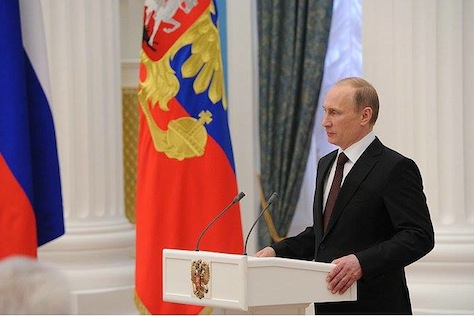In his wide-ranging speech announcing the Russian Federation’s annexation of Crimea from Ukraine, president Vladimir Putin had some choice words for the West: If you don’t like what Russia did in Crimea, you only have yourselves to blame — on the basis of the precedent in Kosovo in 1999.![]()
![]()
Though the officially translated remarks smooth over Putin’s salty language, it appears he used the slang term ‘всех нагнули,’ which, as Masha Gessen describes in Slate, is fairly graphic:
“It was our Western partners who created the precedent; they did it themselves, with their own hands, as it were, in a situation that was totally analogous to the Crimean situation, by recognizing Kosovo’s secession from Serbia as legitimate,” said Putin. And then, as he cited American statements on Kosovo, he got more and more worked up until he said, “They wrote it themselves. They spread this all over the world. They screwed everybody—and now they are outraged!” (The Kremlin’s official translators, who are forever civilizing the Russian president’s speech, translated this sentence as “They wrote this, disseminated it all over the world, had everyone agree, and now they are outraged!” The expression Putin used, however, was “vsekh nagnuli,” street slang for having had nonconsensual anal sex with everybody, rather than for having everybody agree.)
Gessen, in an otherwise fabulous essay that starts with her own days as a war reporter in the late 1990s in Serbia and Kosovo, retells the story of the Primakov loop — a moment that Gessen argues represents a key pivot point in US-Russian relations, when the NATO governments essentially left Russia out of the loop with regarding its campaign against what was then still Yugoslavia and the regime of Serbian strongman Slobodan Milošević.
Ironically, even as the 1999 Kosovo precedent has increasingly become a flash point in the current war of words between Moscow and Washington, Serbians went to the polls on the same day as the Crimea referendum. They elected a majority government under center-right Progressive Party leader Aleksandar Vučić, a government that will be firmly focused on accession to the European Union, which has dangled the economic incentives of EU membership to advance a political settlement between Serbia and Kosovo.
Nonetheless, to understand the Putin doctrine of the 2010s, it’s worth revisiting the origins of the Primakov doctrine of the 1990s, which defined US-Russian relations and European-Russian relations in the same ‘zero-sum game’ terms.
Yevgeny Primakov is one of the more fascinating figures to emerge out of the presidency of Boris Yeltsin.
Continue reading Kosovo, Crimea and Putin’s ‘всех нагнули’ theory of foreign affairs
